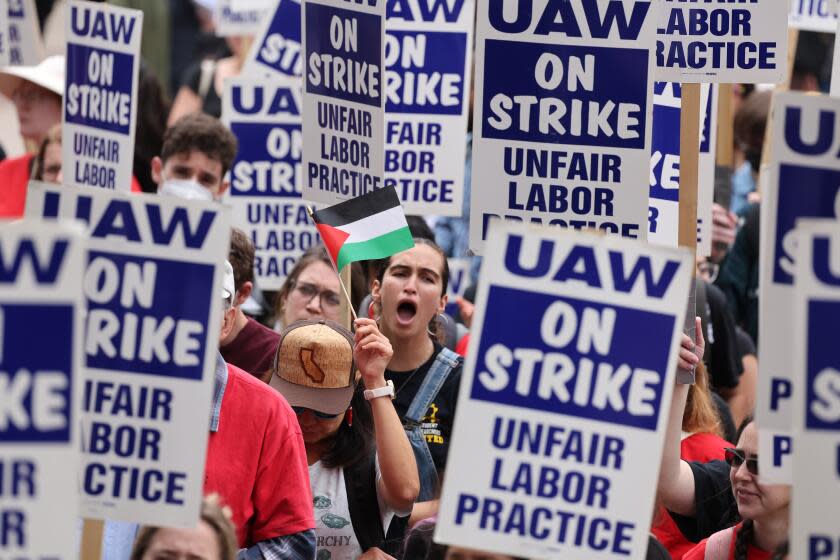Big expansion of UC strike over pro-Palestinian protests: Irvine, San Diego, Santa Barbara next

The UC union representing 48,000 graduate teaching assistants, researchers and other academic workers said Friday that it would expand its ongoing strike next week by calling on thousands of workers at UC San Diego, UC Santa Barbara and UC Irvine to walk off the job, a major escalation of labor tensions that would involve six of the system's 10 campuses.
The decision by leaders of United Auto Workers Local 4811 comes as the union and University of California are battling before a state labor board over the legality of the strike — and are awaiting a ruling on the issue. The union alleges its rights were violated by the UC's actions during pro-Palestinian protests and encampment crackdowns.
Academic workers at UCLA and UC Davis went on strike Tuesday, following UC Santa Cruz union members, who have been picketing since May 20. Union members in San Diego and Santa Barbara are scheduled to walk out Monday. Irvine workers would start Wednesday. The strikes are taking place during finals, a critical time of year when the work of union members — who lead discussion groups, grade papers and administer exams — is particularly important.
UC leaders are "disheartened" at the union's announcement, which they argue will further harm students at the crucial academic moment, said Heather Hansen, a UC spokesperson.
Read more: How pro-Palestinian protests led to a massive UC strike, injecting new fuel into antiwar activism
Hours before the expansion announcement, police in riot gear entered the UC Santa Cruz campus, arresting pro-Palestinian protesters who set up an encampment and blocked the main entrance to campus. A UC Santa Cruz official said the university brought in law enforcement to disband the encampment after repeatedly instructing students — for weeks and Friday morning — to stop their “intentional and dangerous blockade of campus entrances.”
It was not immediately known whether union members were among the protesters or those arrested.
Union members authorized the strikes in mid-May, charging UC leaders with violating the free speech rights of members to speak out about their workplaces when police were called in to remove pro-Palestinian encampments or disperse protests at several campuses, resulting in arrests and suspensions. They also say the university violated members' rights as workers by failing to protect them when a mob attacked protesters at UCLA, including union members, and police took hours to intervene.
UC leaders contend that the strike is illegal because of a no-strike clause in the union's contract, which won significant raises for workers after a 2022 strike.
The union says that provision is irrelevant to its strike because it is based on unfair labor practice charges it filed with the state labor board citing the university's treatment of dozens of pro-Palestinian workers at UCLA, UC Irvine and UC San Diego.
The two parties are currently in mediation via the state's Public Employees Relations Board.
Read more: Police arrest dozens of pro-Palestinian protesters at UC Santa Cruz
Last week, the board denied UC’s request to halt the strike on grounds that it was causing irreparable harm to students, research and operations.
The university doubled down on its injunction request Wednesday, filing evidence citing the spread of strikes this week to UCLA and UC Davis and arguing that union members have disrupted classes and access to campuses. The strikes, it said, were “to the detriment of tens of thousands of students, faculty and other campus community members.”
In a response filed Thursday evening, the union said “the university has failed yet again” to prove its point and that its allegations are “speculative” and “unsubstantiated.” In some cases, the UAW put the blame for campus disruptions and blockages on pro-Palestinian undergraduates or other nonunion groups.
"For the last month, UC has used and condoned violence against workers and students peacefully protesting on campus for peace and freedom in Palestine," UAW 4811 President Rafael Jaime, a UCLA doctoral student, said Friday in a statement. "Rather than put their energies into resolution, UC is attempting to halt the strike through legal procedures. They have not been successful, and this strike will roll on."
He called on UC to address the unfair labor practices charges and begin "with dropping all criminal and conduct charges that have been thrown at our members because they spoke out against injustice.”
UC said the strike is causing "irreparable impacts."
"We are disheartened that UAW continues publicly escalating its unlawful strike in violation of its contracts’ no-strike clause and encouraging its members to disrupt and harm the ability of our students to navigate finals and other critical year-end activities successfully," Hansen said in a statement. "UAW’s goals of 'maximize chaos and confusion' have come to fruition, creating substantial and irreparable impacts on campuses and impacting our students at a crucial time of their education. We are hopeful PERB will intervene and ask the court to end this precedent-setting, unlawful action."
This story originally appeared in Los Angeles Times.


